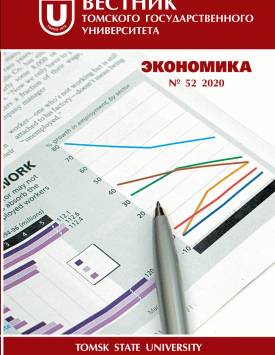Are Russian Consumers Ready for the Technologies of the Future? Practical Approbation of the Digital Innovation Readiness Assessment
In the article, the authors analyze behavioral practices and consumer strategies of digital resistance. They aim to identify the ways to minimize the adverse effect of digitalization. The general framework for this study of digital resistance is the diffusion of innovations theory, which explains resistance to digitalization as an inevitable process that flows simultaneously with and antagonistic to digital innovation. The research is based on the materials of a preliminary in-depth interview about the level of consumer resistance to digitalization. The article proposes an original methodology for measuring the level of readiness to adopt digital innovations. It also shows the results of its testing on a small quota sample. The methodology is a tool to test a potential consumer’s willingness to adopt general and industry-specific digital innovations. It also allows identifying the specific configuration of consumer attitudes towards individual digital solutions being a part of the general complex of digital innovations.
Keywords
resistance to digitalization,
readiness for innovations,
diffusion of innovations,
digital technologies,
consumer behaviorAuthors
| Ryzhkova Marina V. | Tomsk State University; Tomsk Polytechnic University | marybox@inbox.ru |
| Glukhov Andrey P. | Tomsk State University | glukhovap@tspu.edu.ru |
| Soboleva Ekaterina N. | Tomsk State University | soboleva.ek.n@gmail.com |
Всего: 3
References
Ryzhkova M., Glukhov A. Consumer resistance to digitalization on the digital platform market: Preliminary analysis // Global Economics and Management: Transition to Economy 4.0. Springer proceedings in Businness and Economics. 2019. Р. 113-128.
Rindova V., Petkova A. When is a new thing a good thing? Technological change, product form design, and perceptions of value for product innovations // Organization Science. 2007. Vol. 18, № 2. P.217-232.
Rogers E. Diffusion of Innovations. Simon and Schuster. N.Y. : The Free Press A Division of Macmillan Publishing Co, 2003.
Bagozzi R., Lee K.-H. Consumer resistance to, and acceptance of, innovations // Advances in Consumer Research. 1999. Vol. 26 / eds. by Eric J. Arnould, Linda M. Scott. Provo, UT : Association for Consumer Research. P. 218-225.
Davis F., Bagozzi R., Warshaw P. User acceptance of computer technology: a comparison of two theoretical models // Management Science. 1989. Vol. 35, № 8. P. 982-1003.
Ajzen I., Fishbein M. Understanding Attitudes and Predicting Social Behaviour, Prentice-Hall, Eaglewood Cliffs, NJ. 1980.
Roehrich G. Consumer innovativeness: Concepts and measurements // Journal of Business Research. 2004. Vol. 57, № 6. P. 671-677.
Westaby J.D. Behavioral reasoning theory: Identifying new linkages underlying intentions and behavior // Organizational Behavior and Human Decision Processes. 2005. Vol. 98, № 2. P. 97-120.
Hussein Saleh Zolait A., Mattila M., Sulaiman A. The effect of user's informational-based readiness on innovation acceptance // International Journal of Bank Marketing. 2009. Vol. 27, № 1. P. 76-100.
Aguidissou O., Shambare R., Rugimbana R. Internet Banking Adoption in South Africa: The Mediating Role of Consumer Readiness // Journal of Economics and Behavioral Studies. 2017. Vol. 9, № (5(J)). P. 6-17.
Frimpong K., Al-Shuridah O., Wilson A., Asafo-Adjei Sarpong F. Effect of inherent innovativeness and consumer readiness on attitudes to mobile banking // Journal of Financial Services Marketing. 2017. Vol. 22. P. 187-201.
Arts J., Frambach T., Tammo H.A. Generalizations on consumer innovation adoption: A meta-analysis on drivers of intention and behavior // International Journal of Research in Marketing. 2011. Vol. 28, № 2. P. 134-144.
Hussain Saleh Zolait S., Rashidi M. Consumer innovativeness leading to innovation adoption // Pakistan Business Review. 2015. Vol. 17, № 3. P. 562-580.
Цифровая экономика: глобальные тренды и практика российского бизнеса : доклад / под ред. Д.С. Медовникова. 2018. URL: https://imi.hse.ru/pr2017_1 (дата обращения: 07.07.2020).
Аптекман А., Калабин В., Клинцов В., Кузнецова Е., Кулагин В., Ясеновец И. Цифровая Россия: новая реальность. Digital/McKinsey. 2017. URL: http://www.tadviser.ru/images/c/c2/Digital-Russia-report.pdf (дата обращения: 07.07.2020).
Ростова А., Желнина Е. Возможности использования шкалы Богардуса для измерения инновационной открытости населения // Карельский научный журнал. 2017. Т. 6, № 4(21). C. 354-357.
Пишняк А., Халина Н. Адаптация среднего класса к инновациям: восприятие но вых технологий и открытость к ним // XXI Апрельская международная научная конференция по проблемам развития экономики и общества. 2020. URL: https://www.hse.ru/data/2020/05/20/1547848381/Пишняк_Халина_Доклад_Апрельская_ко нференция_2019.pdf (дата обращения: 07.07.2020).

